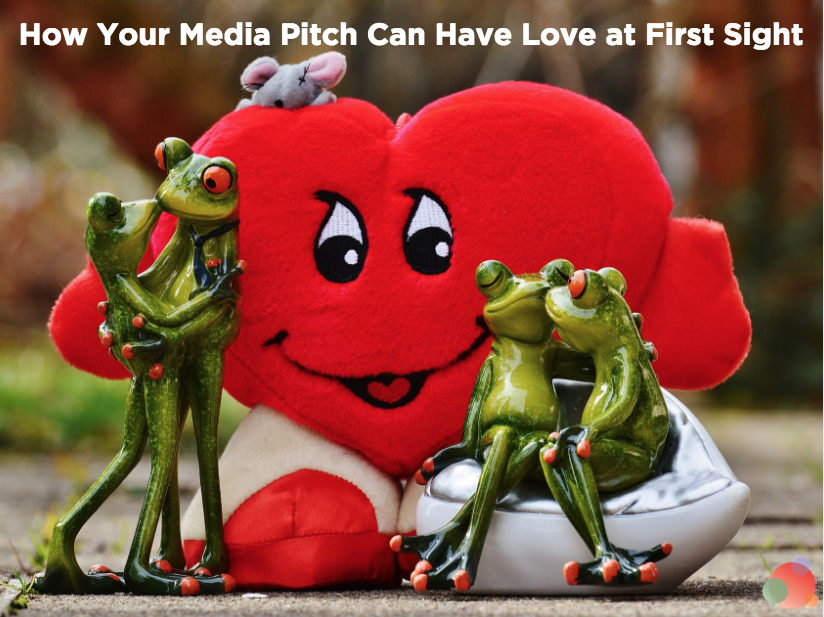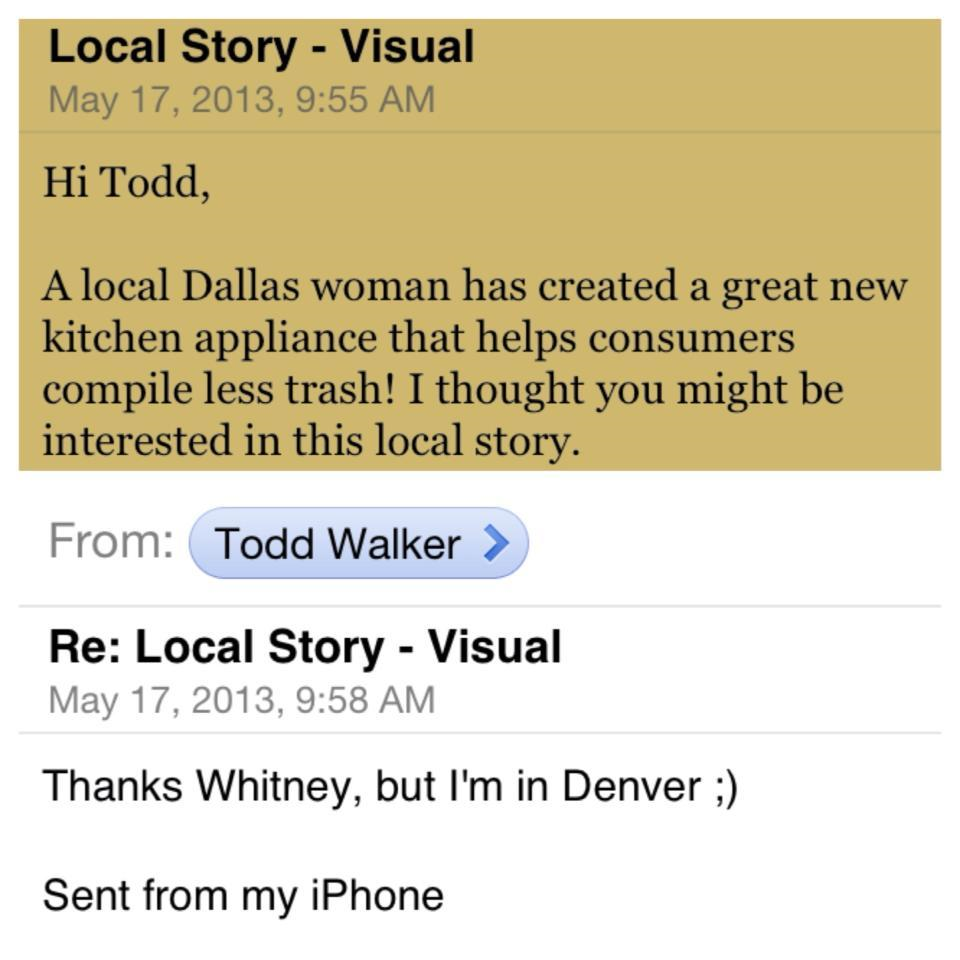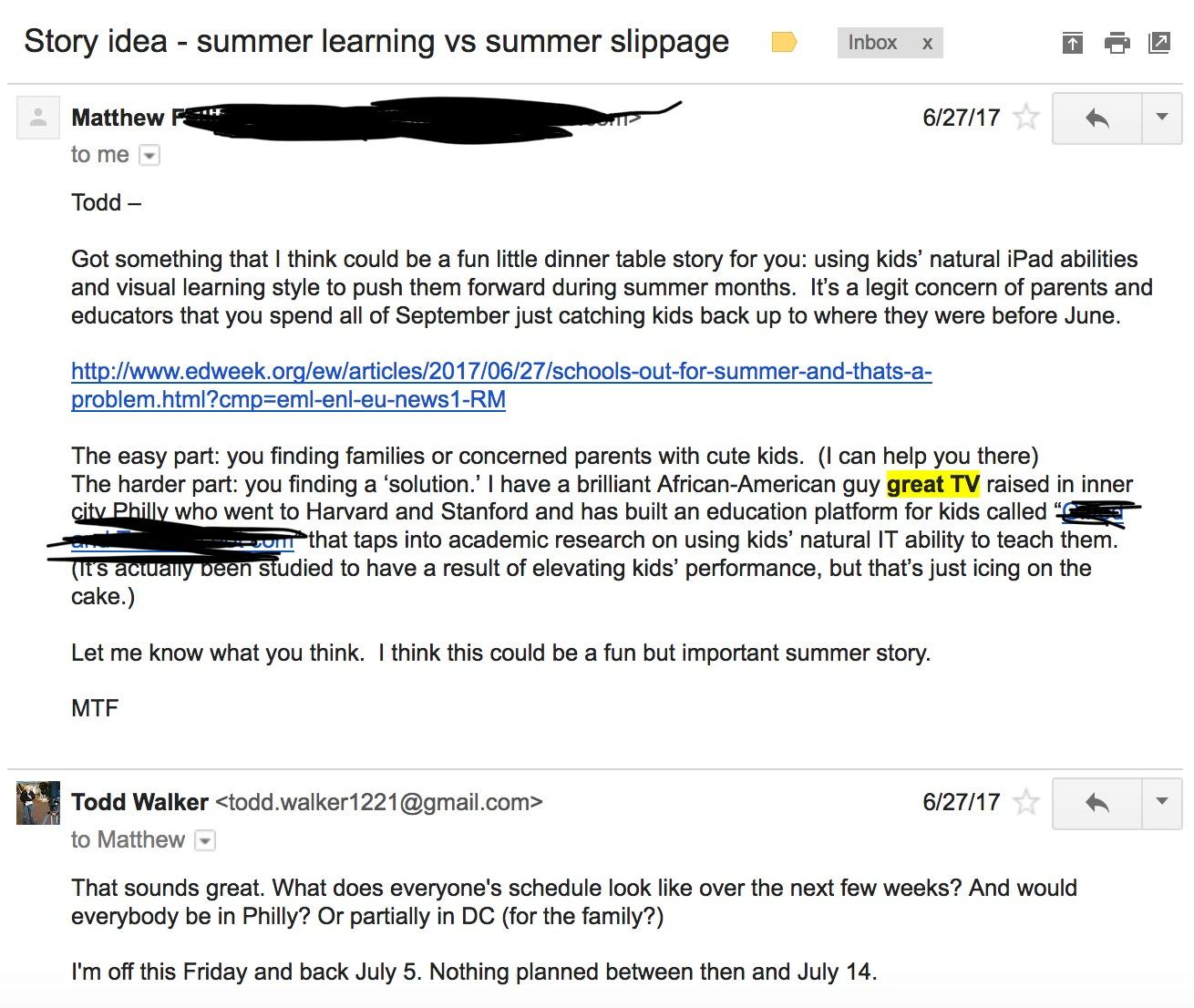 The last time I checked my work inbox I had approximately 97,000 unread emails.
The last time I checked my work inbox I had approximately 97,000 unread emails.
Roughly 300 of those stated there was cake in the break room.
The remaining 96,700 were some combination of a media pitch: news releases and story ideas.
Unread.
A few times a week I’d open one and promptly delete it.
I would respond to maybe one per week. ONE!
The rare media pitch I responded to had a few things in common.
I’ll tell you what they are, coming up.
(I was a TV reporter for a dozen years. Some things are hard to shake.)
But First, a Story
Picture it: you’re single (if you’re not, just play along) and at a bar with your friends.
You know you can usually rely on those friends for good conversation and a good time. Suddenly, a stranger approaches and interrupts the spirited conversation you were having and attempts to flirt with you.
This person has no game, knows nothing about you, is clearly not your type and has been hitting on every other person in the bar using the same terrible pickup lines.
Unless you’re desperate or have no standards, you’re going to ignore that person or politely tell them you’re not interested.
If they don’t get the message, the bouncer may have to eventually throw them out.
A short time later, after the conversation with your friends has died down, another stranger approaches.
This stranger compliments you on what you’re wearing and has heard about you from mutual friends. They looked you up and found you have some common interests.
They also heard what you did to that guy from earlier.
They’re impressed you have standards, and they’re bringing their A-game.
A conversation ensues, yada yada yada, suddenly you have a date for Friday night.
Or even better, y’all are leaving together right now. End scene.
The “friends” in this scenario are regular sources and PR folk I talk to all the time.
We’ve worked together before, and we work together well.
You, the flirty stranger, are the PR pro I don’t know and are trying to cut through the crowd. Doing a little homework, and good timing goes a long way. It also makes you look less desperate.
Every reporter is busy. All the time. The clock is ticking towards deadline from the moment we wake up. Every reporter also gets hundreds of emails per day.
I dealt with this by setting up filters and folders. Any media pitch sent directly and only to me was on the top. I checked it constantly and rarely did not open an email.
Any message where I was not the sole recipient (FOR IMMEDIATE RELEASE, cake in the break room, etc.) went in other folders. Scanning once a day, and rarely opening.
So what do those rare emails that elicited a response, out of the 97,000 from earlier, all have in common?
You’re Personal!
My PR friends whom I worked with regularly knew I would ALWAYS respond if they sent me a personal email.
Maybe a news release was attached further down, but often it was, “Hey Todd, I have this going on soon. You interested?”
Sometimes I was, sometimes I wasn’t. But they always got a response.
You Know What I Cover, So Pitch Relevant Stories

For most of my career (save for two years on a morning show) I covered the hard-hitting news.
I was the lead story locally or nationally almost every day.
A media pitch asking me to cover your cat fashion show or waterskiing squirrel (both Anchorman references and both real pitches I’ve received) is wasting both of our time.
If you’re pitching a product, find out who covers consumer issues.
If you’re pitching your company’s CEO as an expert in ___ field, take a few minutes and scan our bios to find out who covers ___ field.
Let Me Tweak Your Story Idea
I received a media pitch a few years ago from a friend in the music business who was launching new country artist, Cam.
I believe the pitch was only about her new album launching.
That wasn’t nearly newsy enough for me to take to my bosses, so I asked if we could do a story on launching a new artist in the streaming era, and the tricky business behind it.
The bosses were cool with that angle, and after some schedule shuffling with Cam and executives from RCA, we turned it into a 3:30 piece.
A standard TV package is 1:30 or less.
A record album launch would never make a standard newscast.
But because they let me tweak the pitch and do a newsy angle they got more than double the airtime.
You Recognize a Slow News Day
The absolute best day to pitch your story to a journalist is the day AFTER a major holiday. There is no news. We are desperate.
Whatever holiday-related stories are now old news, but no one is back to work and returning our calls.
You pitch it and have people ready to go on record, and you have a darn good chance of it getting aired/published.
Keep track of the news in whatever market you want to pitch.
Is there a major scandal going on at city hall and it’s dominating every outlet’s time and resources?
Maybe wait a few days for your media pitch with a completely unrelated story.
Make Your Media Pitch Exclusive
Or at least give me first crack at it.
It was my job to walk into the story meeting every day with original story ideas.
The news release that went out to every news organization in town, and every reporter in the newsroom, is not an original idea to pitch.
If it was assigned to anyone at all, it went to whoever had the worst or no ideas for the day.
And it’d be the first story cut in half or left out altogether when more important news broke.
If I’m the only one pitching that idea in the story meeting, it has a better chance of getting the boss’s approval.
If it doesn’t make the cut that day, but it was still a good idea, I’ll hang onto it and pitch it again tomorrow.
People Are Ready and Waiting to Be Interviewed. Now.
I was in the daily game. I had a deadline every single day; sometimes multiple times per day.
The first person to say yes to an interview was going to find themselves on the news that night.
I knew the PR people I could count on to produce an interview subject for me on short notice. I called them first every time.
If you can anticipate news that’s relevant to your company or brand and proactively offer up an expert to go on camera between ___ and ___ times (or right now) you were my favorite person in the world and number one on my call list going forward.
On the flip side: if there is news happening now but your expert isn’t available until tomorrow, I’m moving on to whoever has someone available now.
If it happens too many times, I’m going to stop calling.
Give Me Updates
So, your media pitch was successful enough to get me to take it to the story meeting.
Great news: the bosses are interested!
I call you back and say, “Okay, it’s a go.” You say you’re going to call around and get things set up.
Then I don’t hear anything for hours…. or I get “still checking.”
Meanwhile, my deadline is ticking closer. Give me updates on the process.
“I’m checking with the CEO’s secretary about their availability for this afternoon. I’ll give you an update in 15 minutes.”
Even if 15 minutes later you still don’t have anything, a “haven’t heard back, but I do know he has some time and I’ll give you another update in 15 minutes” keeps me on the hook.
Just a “still checking” or no update at all makes me more likely to cut bait and move on when something better/immediate comes along.
Make Your Story Visual, But Not Staged
The best pitches I ever received could tell me what I was going to see, and when.
Action is always the preference.
People doing things beats a lovely display on a table or well-placed banner every time.
Great, active visuals make it more likely your story will get more time on air and longer video/more pictures online.
Stale visuals meant I was leaving that event as soon as possible.
On the flip side, staging action is the number one ethical no-no out there.
If a journalist is okay with it, you probably pitched the wrong one.
(This is a blog topic for another day.).
Or, if all else fails, let me try it!
Don’t Overpromise
I lost count many years ago of how many times a media pitch sounded amazing in my email inbox, but was a total dud when I showed up.
Yes, if it’s published or goes on-air, it’s probably mission accomplished from a PR standpoint, but I’m going to remember for next time.
Your next media pitch will probably go in that big ignored pile.
I’m also probably on the phone with my editor/producer saying, “This is nothing/boring. You can pull me if something breaks.”
Make Your Media Pitch Personal…Again!
As you send the personal media pitch, tell me you have someone who is personally impacted or who benefits from the product you’re pitching me.
Last year, I got a story pitch about an online tutoring site that was helping combat against “summer slide” (when kids forget what they learned the previous year and teachers have to spend weeks catching them back up).
A story on a website is almost always a visual dud.
BUT, this PR pro I’ve known for years (and knew I was asking for it) had a family ready for an interview on a moment’s notice about how it helped them.

Once you’ve got personal impact, don’t plop them down in your conference room.
The story is once again a visual dud.
It may take some convincing, and you may have to help them tidy up, but having an interview subject on their own turf instantly makes them more comfortable when cameras show up, and it makes them seem more real.
Conference rooms are where stories go to die.
If You Follow All of the Above…
I can’t guarantee a slam dunk every time, but chances that your media pitch is read and responded to will greatly increase.
And, I even threw in some dating advice for free.
You’re welcome.